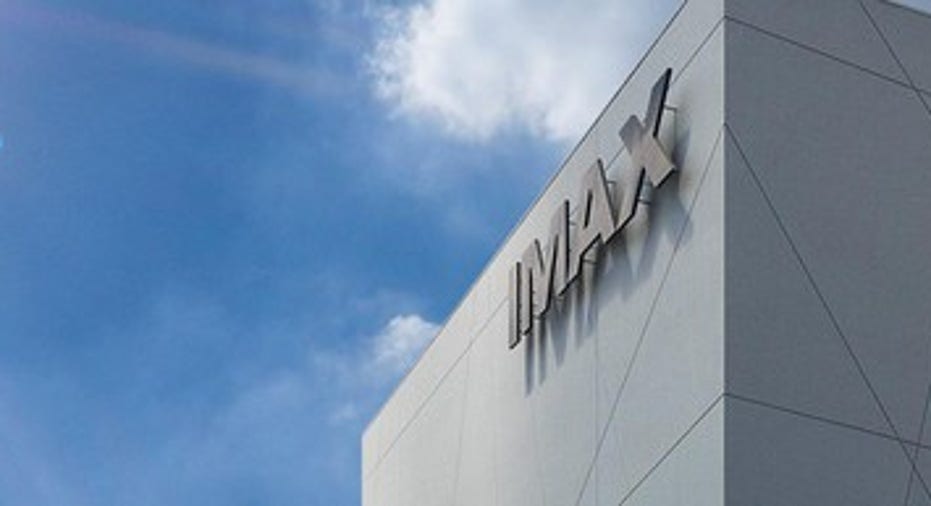IMAX Stays Optimistic Despite Falling Sales, Earnings

Like many companies in the entertainment business, big-screen theater specialist IMAX (NYSE: IMAX) relies on high-quality content to drive its results. When blockbusters are prevalent, the company benefits from larger numbers of theatergoers, but IMAX has to deal with its fair share of down years, as well.
Coming into Thursday's fourth-quarter financial report, IMAX investors had prepared themselves for sluggish results, and IMAX wasn't able to overcome industry headwinds. However, the company managed to keep itself moving forward in terms of its long-term strategic goals, and that should bode well for the future.
Let's look more closely at IMAX to see how it did, and what it sees in 2017 and beyond.
Image source: IMAX.
IMAX deals with Hollywood blues
IMAX's fourth-quarter results showed some of the weakness that the industry has faced. Total revenue was down 10%, to $106.9 million, but that was actually significantly better than the 16% drop in sales that those following the stock had expected to see. Net income plunged by three-fifths, to $8.9 million, and that produced earnings of $0.13 per share. Yet after accounting for some one-time items, adjusted earnings of $0.27 per share was $0.06 higher than the consensus forecast among investors.
Looking more closely at the numbers, IMAX continued to focus on growing its network of theaters. The company said that it installed 73 theaters during the quarter, 70 of which were new, and three representing upgrades.
Signings for new contracts slowed down considerably from previous quarters, but IMAX still brought in 26 theater contracts, concentrated in China, the U.S., and France. The openings brought the company's total theater network to 1,215 systems, including more than 1,100 in commercial multiplex locations. Moreover, backlogs remained strong at nearly 500 theater systems at the end of the year.
Still, falling sales plagued all of IMAX's segments. Revenue from sales and sales-type leases of theaters were down 6% from year-ago levels, with lower margins coming from the installation of laser-based digital systems. Joint revenue-sharing arrangements saw a more dramatic segment sales decline of nearly a quarter, and IMAX blamed lower box-office revenue and adverse foreign exchange trends for the drop. Even in the production and DMR area, segment sales were down 13%, and higher marketing costs vied with falling box office receipts in pulling revenue downward.
Indeed, Hollywood was clearly weaker in the period. Gross box-office figures plunged 15%, to $246.5 million, and average box office per screen was down by more than a quarter, to $233,300.
IMAX CEO Richard Gelfond kept things in a longer-term perspective. During 2016, Gelfond said, "We further established IMAX as a leader in the entertainment industry through two key growth initiatives: original content and virtual reality." The CEO pointed to strong demand for the IMAX format among theatergoers, and the growing network of locations should only add to its popularity in the future.
Can IMAX do better in 2017?
IMAX believes that 2017 should show improving industry conditions that will bolster its results. In Gelfond's words, "With a global footprint of 1,215 theaters in 75 countries and a promising blockbuster-driven 2017 film slate that features more IMAX differentiation than any year in our history, we believe we're extremely well-positioned for future growth."
Indeed, IMAX has worked hard to try to find and retain strong content into the future. Earlier in the week, the theater company said that it had extended a relationship with Disney (NYSE: DIS) through 2019, capturing key releases in the Star Wars and Indiana Jones franchises, as well as various Marvel Studios films. Special shots filmed using IMAX cameras will give audiences even more incentive to see these films at IMAX locations, producing a win-win for both parties.
Still, IMAX shareholders weren't entirely satisfied with the results, and the stock fell 2% in after-hours trading following the announcement. In the long run, though, IMAX remains on course to bolster its fundamental performance and keep growing across the globe in 2017 and in the years to come.
10 stocks we like better than IMAXWhen investing geniuses David and Tom Gardner have a stock tip, it can pay to listen. After all, the newsletter they have run for over a decade, Motley Fool Stock Advisor, has tripled the market.*
David and Tom just revealed what they believe are the 10 best stocks for investors to buy right now... and IMAX wasn't one of them! That's right -- they think these 10 stocks are even better buys.
Click here to learn about these picks!
*Stock Advisor returns as of February 6, 2017
Dan Caplinger owns shares of Walt Disney. The Motley Fool owns shares of and recommends IMAX and Walt Disney. The Motley Fool has a disclosure policy.



















